高二英语选修七第一单元课文知识点讲解
- 格式:ppt
- 大小:59.00 KB
- 文档页数:11
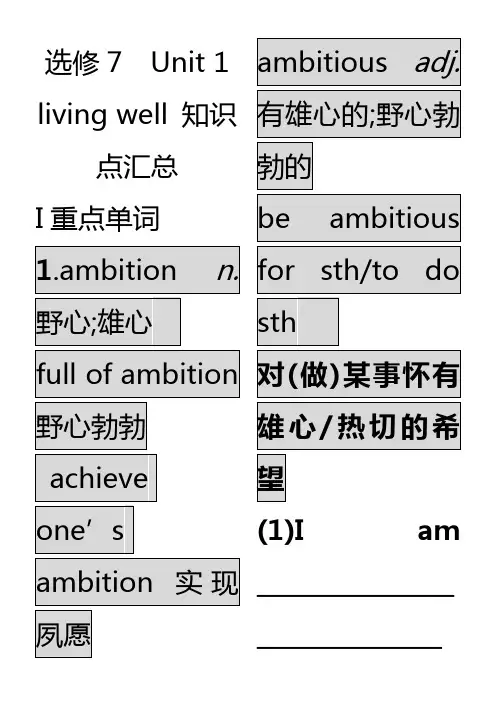
选修7 Unit 1 living well 知识点汇总I重点单词(1)I am ________________ _______________(热切希望能成功) in life. (2)His_____________________________(要做首相的雄心) is likely to be realized. (3)Finallyhe ________________________(实现梦想)throughyears of hard work.(1) 我们什么时候见面合适呢?________________ ________________ ___?(2)我没有适合在聚会上穿的衣服。
________________ ________________ _____.(1)均衡饮食有益于健康。
________________ ________________ _____.(2)We should spend the money on sth that will ________________________________ ____.(大家都能受益的)(3)We_______________ _________(很受益) taking daily exercises. (4)His mother lost her life________________ _____.(为了银行的利益)介词填空: (1)The play is adapted_______ a novel.(2)This book is adapted _______ beginners. (3)When yougo to a new country, you must adapt yourself ____ new customs.(4)Novels are often adapted______ the stage, television and radio. (5)(2009.浙江高考) The good thing about children is that they ______easily to new environment.A. adaptB. adopt.adjust D.appeal你又一次上课迟到使老师很恼火。
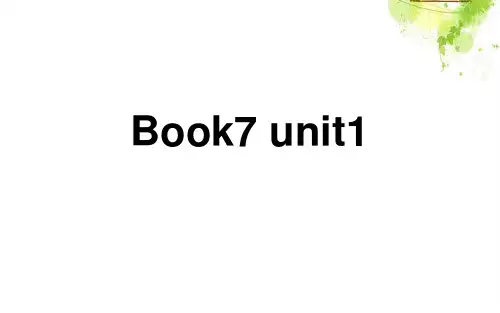
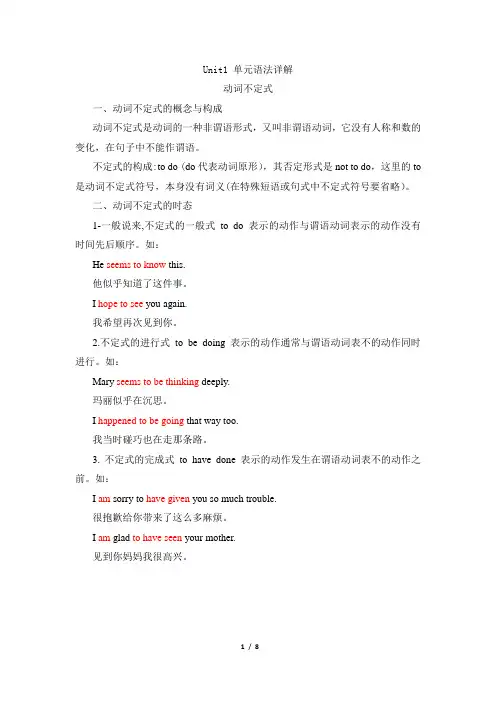
Unit1 单元语法详解动词不定式一、动词不定式的概念与构成动词不定式是动词的一种非谓语形式,又叫非谓语动词,它没有人称和数的变化,在句子中不能作谓语。
不定式的构成:to do (do代表动词原形),其否定形式是not to do,这里的to 是动词不定式符号,本身没有词义(在特殊短语或句式中不定式符号要省略)。
二、动词不定式的时态1-一般说来,不定式的一般式to do表示的动作与谓语动词表示的动作没有时间先后顺序。
如:He seems to know this.他似乎知道了这件事。
I hope to see you again.我希望再次见到你。
2.不定式的进行式to be doing表示的动作通常与谓语动词表不的动作同时进行。
如:Mary seems to be thinking deeply.玛丽似乎在沉思。
I happened to be going that way too.我当时碰巧也在走那条路。
3.不定式的完成式to have done表示的动作发生在谓语动词表不的动作之前。
如:I am sorry to have given you so much trouble.很抱歉给你带来了这么多麻烦。
I am glad to have seen your mother.见到你妈妈我很高兴。
三、动词不定式的用法动词不定式没有人称和数的变化,具有名词、形容词和副词等的功能,在句中可作主语、宾语、表语、定语、状语、补足语等。
1.动词不定式作主语动词不定式作主语时,为避免句子的头重脚轻,常用it作形式主语,而真正的主语动词不定式后置。
如要说明动作的执行者,可在不定式前加for sb.;但如果表语是nice、kind、clever等描述动作执行者的性格、品质等的形容词,则应在不定式前加of sb.常用句型是“It+be+adj./n.(+for/of sb.) +to do sth.”和“It takes/took sb. some time to do sth, 如:It is a great pleasure to talk with跟他交谈是一件高兴的事情。
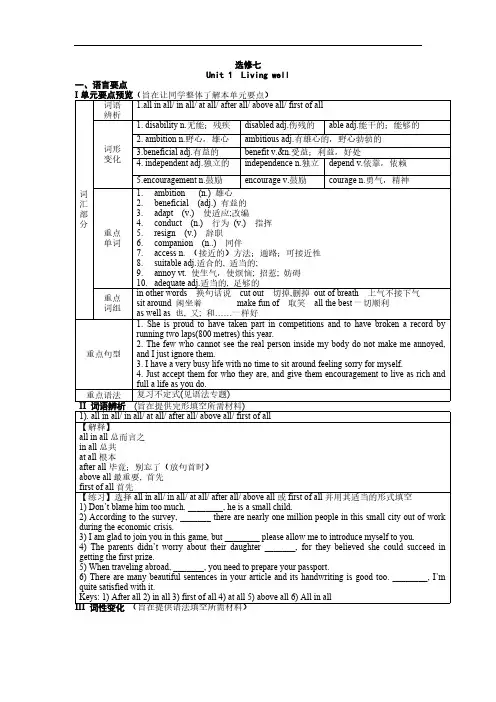
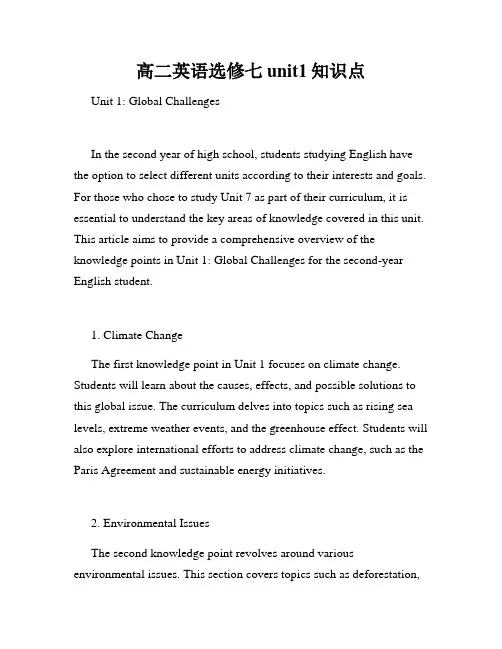
高二英语选修七unit1知识点Unit 1: Global ChallengesIn the second year of high school, students studying English have the option to select different units according to their interests and goals. For those who chose to study Unit 7 as part of their curriculum, it is essential to understand the key areas of knowledge covered in this unit. This article aims to provide a comprehensive overview of the knowledge points in Unit 1: Global Challenges for the second-year English student.1. Climate ChangeThe first knowledge point in Unit 1 focuses on climate change. Students will learn about the causes, effects, and possible solutions to this global issue. The curriculum delves into topics such as rising sea levels, extreme weather events, and the greenhouse effect. Students will also explore international efforts to address climate change, such as the Paris Agreement and sustainable energy initiatives.2. Environmental IssuesThe second knowledge point revolves around various environmental issues. This section covers topics such as deforestation,pollution, and the depletion of natural resources. Students will delve into the impacts of these issues on ecosystems, wildlife, and human populations. Furthermore, the curriculum emphasizes the importance of individual and collective actions in preserving the environment.3. Poverty and InequalityThe third knowledge point of Unit 1 explores poverty and inequality globally. Students will learn about the causes and consequences of poverty, as well as the factors that contribute to global inequality. The curriculum aims to foster empathy and understanding, encouraging students to reflect on their roles in promoting social justice and equal opportunities for all.4. Health and DiseaseThe fourth area of knowledge focuses on health and disease. Students will examine global health challenges, including infectious diseases, public health policies, and access to healthcare. The curriculum empowers students to think critically about the factors that impact health outcomes and the importance of international cooperation in tackling these issues.5. Global ConflictsThe final knowledge point centers around global conflicts. Students will gain insights into the causes and consequences of conflicts, such as war, terrorism, and political disputes. The curriculum encourages students to develop a nuanced understanding of these complex issues and to consider peaceful resolutions and diplomacy as viable solutions.In conclusion, Unit 1: Global Challenges of the second-year English curriculum explores various topics related to climate change, environmental issues, poverty and inequality, health and disease, and global conflicts. By studying these knowledge points, students will gain a broader perspective on the challenges facing our world today and the importance of global cooperation.。
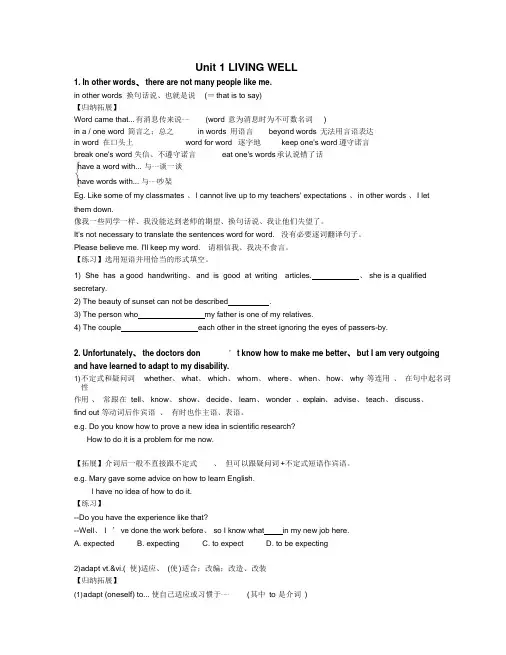
Unit 1 LIVING WELL1. In other words、 there are not many people like me.in other words 换句话说、也就是说(=that is to say)【归纳拓展】Word came that... 有消息传来说⋯⋯(word 意为消息时为不可数名词)in a / one word 简言之;总之in words 用语言beyond words 无法用言语表达in word 在口头上word for word 逐字地keep one's word 遵守诺言break one's word 失信、不遵守诺言eat one's words 承认说错了话have a word with... 与⋯⋯谈一谈have words with... 与⋯⋯吵架Eg. Like some of my classmates 、I cannot live up to my teachers' expectations 、in other words 、I let them down.像我一些同学一样、我没能达到老师的期望、换句话说、我让他们失望了。
It's not necessary to translate the sentences word for word. 没有必要逐词翻译句子。
Please believe me. I'll keep my word. 请相信我、我决不食言。
【练习】选用短语并用恰当的形式填空。
1) She has a good handwriting、 and is good at writing articles. 、 she is a qualified secretary.2) The beauty of sunset can not be described .3) The person who my father is one of my relatives.4) The couple each other in the street ignoring the eyes of passers-by.2. Unfortunately、 the doctors don ’t know how to make me better、 but I am very outgoing and have learned to adapt to my disability.1) 不定式和疑问词whether、 what、 which、 whom、 where、 when、 how、 why 等连用、在句中起名词性作用、常跟在tell、 know、 show、 decide、 learn、 wonder 、explain、 advise、 teach、 discuss、find out 等动词后作宾语、有时也作主语、表语。
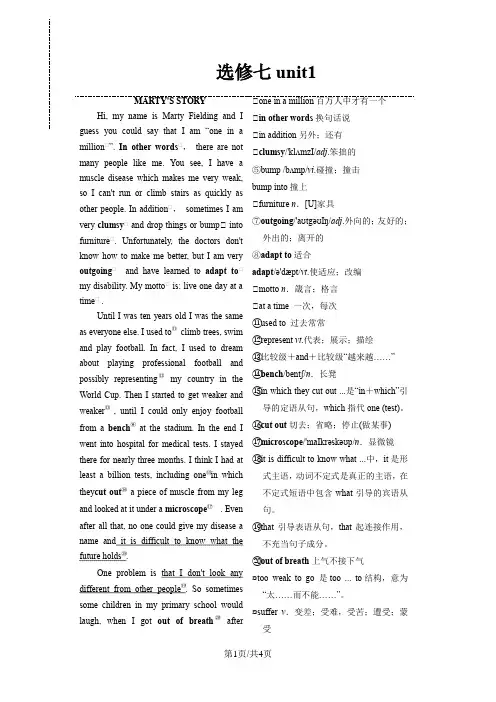
选修七unit1MARTY'S STORYHi, my name is Marty Fielding and I guess you could say that I am “one in a million①”. In other words①,there are not many people like me. You see, I have a muscle disease which makes me very weak, so I can't run or climb stairs as quickly as other people. In addition①,sometimes I am very clumsy① and drop things or bump① into furniture①. Unfortunately, the doctors don't know how to make me better, but I am very outgoing①and have learned to adapt to①my disability. My motto① is: live one day at a time① .Until I was ten years old I was the same as everyone else. I used to⑪climb trees, swim and play football. In fact, I used to dream about playing professional football and possibly representing⑫my country in the World Cup. Then I started to get weaker and weaker⑬, until I could only enjoy football from a bench⑭at the stadium. In the end I went into hospital for medical tests. I stayed there for nearly three months. I think I had at least a billion tests, including one⑮in which they cut out⑯a piece of muscle from my leg and looked at it under a microscope⑰ . Even after all that, no one could give my disease a name and it is difficult to know what the future holds⑱.One problem is that I don't look any different from other people⑲. So sometimes some children in my primary school would laugh, when I got out of breath⑳after ①one in a million百万人中才有一个①in other words换句话说①in addition另外;还有①clumsy/'klʌmzI/adj.笨拙的⑤bump /bʌmp/vi.碰撞;撞击bump into撞上①furniture n.[U]家具⑦outgoing/'aʊtgəʊIŋ/adj.外向的;友好的;外出的;离开的⑧adapt to适合adapt/ə'dæpt/vt.使适应;改编①motto n.箴言;格言①at a time 一次,每次⑪used to 过去常常⑫represent vt.代表;展示;描绘⑬比较级+and+比较级“越来越……”⑭bench/bentʃ/n.长凳⑮in which they cut out ...是“in+which”引导的定语从句,which指代one (test)。
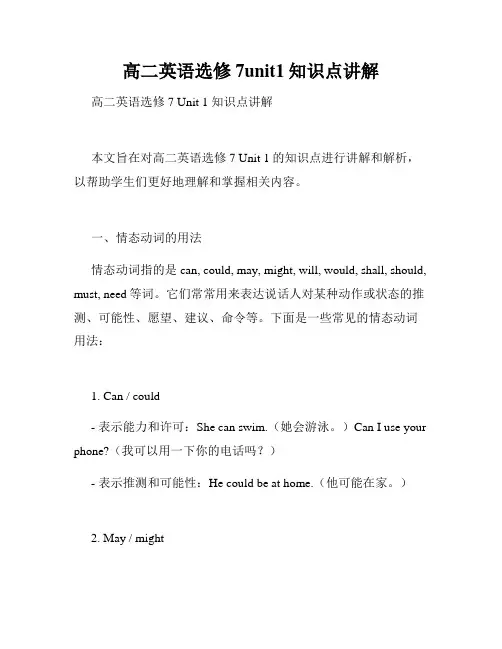
高二英语选修7unit1知识点讲解高二英语选修7 Unit 1 知识点讲解本文旨在对高二英语选修7 Unit 1的知识点进行讲解和解析,以帮助学生们更好地理解和掌握相关内容。
一、情态动词的用法情态动词指的是can, could, may, might, will, would, shall, should, must, need等词。
它们常常用来表达说话人对某种动作或状态的推测、可能性、愿望、建议、命令等。
下面是一些常见的情态动词用法:1. Can / could- 表示能力和许可:She can swim.(她会游泳。
)Can I use your phone?(我可以用一下你的电话吗?)- 表示推测和可能性:He could be at home.(他可能在家。
)2. May / might- 表示许可和推测:May I go to the restroom?(我可以去洗手间吗?)She might be in the library.(她可能在图书馆。
)3. Will / would- 表示意愿和请求:Will you please pass me the salt?(请你把盐递给我好吗?)Would you mind closing the window?(你介意关上窗户吗?)4. Shall / should- 表示建议和命令:You should go to bed early.(你应该早点睡觉。
)Shall we start the meeting?(我们开始开会吧?)5. Must- 表示必须和推测:I must finish my homework before leaving.(我必须在离开之前完成作业。
)He must be tired.(他一定累了。
)二、被动语态的构成和使用被动语态用于强调动作的承受者而不是执行者,构成形式为“be+过去分词”。
下面是被动语态的一些常见用法和构成方式:1. 一般现在时的被动语态主语 + am / is / are + 过去分词- The book is written by a famous author. - This car is made in Germany.2. 一般过去时的被动语态主语 + was / were + 过去分词- The house was built last year.- The letter was sent by my sister.3. 一般将来时的被动语态主语 + will / shall + be + 过去分词- The meeting will be held next Monday. - The tickets will be sold online.4. 情态动词的被动语态情态动词 + be + 过去分词- The book can be borrowed from the library.- The problem must be solved immediately.三、定语从句的引导词和使用定语从句用于修饰某个名词或代词,在从句中起修饰作用的句子叫做定语从句。

人教版课程标准实验教材〔英语选修7第1单元〕知识讲解第一单元考点预览: 1词汇:ambition, adapt , beneficial , similar, absence , including , ignore, encour agement2 短语: make fun of, set up, even though , dream about , at least , as well as , as well , deal with, in other words,out of bre ath, all in all live a …life, get annoyed , be different from语言点:1.try (v, n)(1)试图,设法,努力I don’t know if I can come , but I’ll try.(2)试,试用,试验Have you tried this new coffee? It’s very good . 尝过(3)try 后可接名词,动名词,不定式,what 从句等a Joh n isn’t here. Try phoning his home number.b What are you trying to do ?c Try the suit on to see whether it fits you .(4)try to do sth 努力做某事; try doing sth 尝试做某事为什么不尝试乘火车去那里呢?_____________________________________________________________ _____?他努力地要把箱子搬到楼上,但失败了。
______________________________________________________ ______如果前门没有人开,你可以敲后门试试。
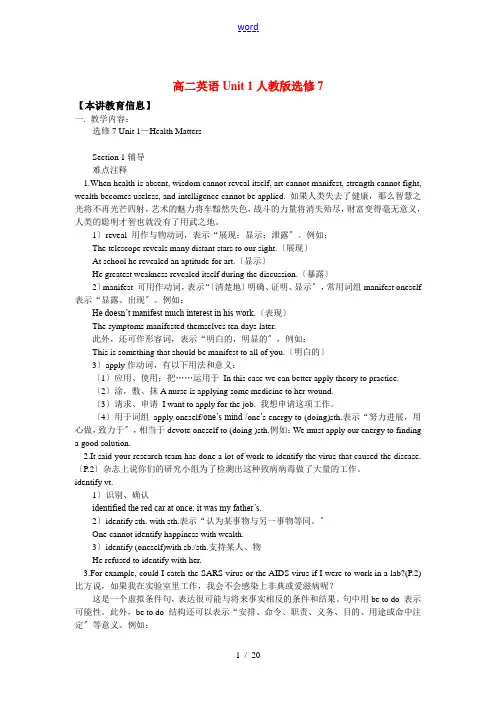
高二英语Unit 1人教版选修7【本讲教育信息】一. 教学内容:选修7 Unit 1—Health MattersSection 1辅导难点注释1.When health is absent, wisdom cannot reveal itself, art cannot manifest, strength cannot fight, wealth becomes useless, and intelligence cannot be applied. 如果人类失去了健康,那么智慧之光将不再光芒四射,艺术的魅力将车黯然失色,战斗的力量将消失殆尽,财富变得毫无意义,人类的聪明才智也就没有了用武之地。
1〕reveal 用作与物动词,表示“展现;显示;泄露〞。
例如:The telescope reveals many distant stars to our sight.〔展现〕At school he revealed an aptitude for art.〔显示〕He greatest weakness revealed itself during the discussion.〔暴露〕2〕manifest 可用作动词,表示“〔清楚地〕明确、证明、显示〞,常用词组manifest oneself 表示“显露、出现〞。
例如:He doesn’t manifest much interest in his work.〔表现〕The symptoms manifested themselves ten days later.此外,还可作形容词,表示“明白的,明显的〞,例如:This is something that should be manifest to all of you.〔明白的〕3〕apply作动词,有以下用法和意义:〔1〕应用、使用;把……运用于In this case we can better apply theory to practice.〔2〕涂,敷、抹A nurse is applying some medicine to her wound.〔3〕请求、申请I want to apply for the job. 我想申请这项工作。
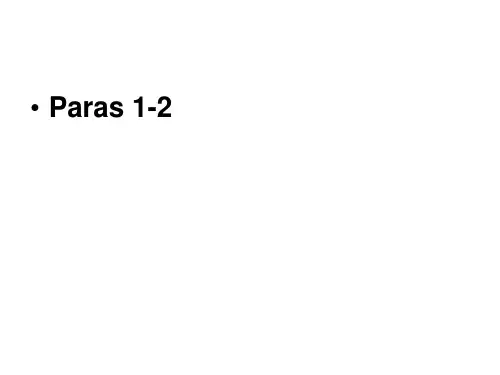
第一部分教材梳理选修七Unit 1 Living well 一、语言要点1. ambition (n.) 雄心ambitious adj. 志向远大的; 有雄心壮志的;有野心的be ambitious for [power, social position, etc.] 极欲获得[权力, 社会地位等]be ambitious of success渴望成功be ambitious to serve the people一心想为人民服务1) Her ambition is the presidency. 她的抱负是成为一名总统2) After several hours’ work, she had no ambition to go dancing. 没有精力去跳舞了3) The prince was attracted by the girl’s beauty, and ambitious to marry her.王子为女孩的美貌打动了,渴望能娶到她。
2.beneficial (adj.) 有益的benefit v. &n.有助于;受益;利益,好处be beneficial to sth./sb.对……有益be of benefit to对……有益for the benefit of为了……(的利益)benefit from从……中受益1) A temperate climate is beneficial to the health; 温和气候有利于健康.2) Sunshine is beneficial to plants. 阳光对植物有益。
3) I hope what I have written will be of benefit to someone else who may feel the same way. 我希望我写的这些将对有同感的人有帮助.4) Both sides have benefited from the talks.双方都从和谈中受益。